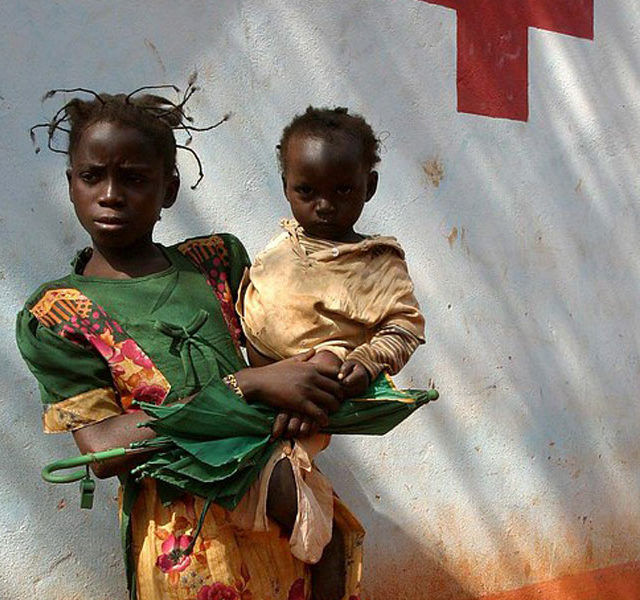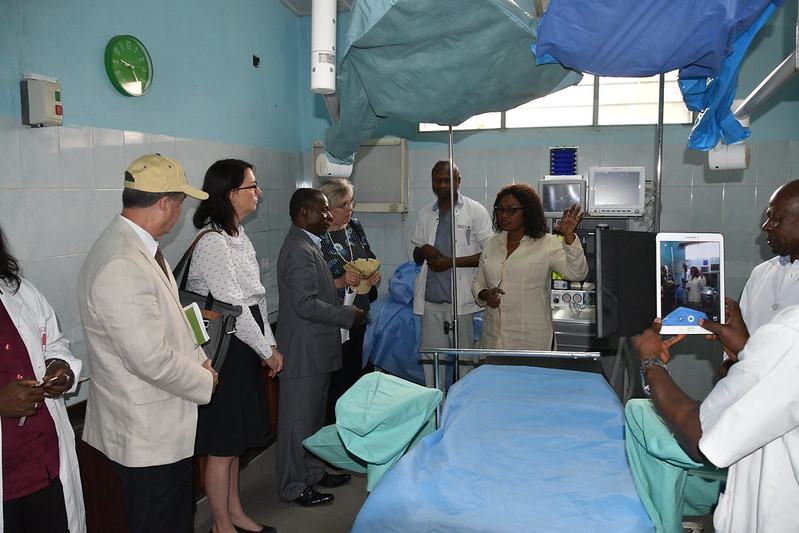Non-Communicable Diseases, cholera, Lassa fever, Omicron or even measles are rampant on the continent depending on the country. Apart from the direct human consequences, these various diseases also have strong economic consequences. The mobilization of all actors is therefore essential to fight to eradicate them.
A new global compact on non-communicable diseases launched in Accra
Ghana, Norway and the WHO (World Health Organization) signed an agreement on Tuesday 12 April to accelerate action to save lives from non-communicable diseases. This was on the back of the first international policy dialogue on NCDs and the SDGs, held in Accra, Ghana. It was with Ghanaian President Nana Akufo Addoh, and his Norwegian counterpart Jonas Gahr Støre.
They underlined the urgency of the “NCD pandemic”, which kills 7 out of 10 people worldwide due to risk factors such as tobacco, alcohol, unhealthy diet, physical inactivity and air pollution.
According to the WHO, nearly 7 million lives could be saved for just $0.84 per person per year by 2030. “This investment would realize more than $230 billion in economic and societal benefits and avert nearly 10 million heart attacks and strokes worldwide by 2030,” the UN agency added.
“Tackling the NCD phenomenon requires leadership that gives visibility to NCD issues. I ask my fellow Heads of State to join me in creating a (non-binding) presidential group, and to find solutions to NCDs with a universal health coverage roadmap and the Sustainable Development Goals. In our time, this will be our legacy,” said Nana Akufo-Addo, President of Ghana.
The new alliance is expected to bring together countries championing the NCD agenda, with an annual meeting at the UN General Assembly. The first meeting is expected to take place in September 2022.
This alliance is announced in a context where non-communicable diseases such as cancer, cardiovascular diseases and diabetes are becoming the main cause of death in sub-Saharan Africa. These diseases were responsible for 37% of deaths in 2019, compared to 24% in 2000.

1.9 million oral vaccines for the fight against cholera in Malawi
This week, WHO provided the government of Malawi with 1.947 million doses of oral cholera vaccine, which will be administered in the eight districts of Nsanje, Chikwawa, Mulanje, Phalombe, Blantyre, Machinga, Balaka and Mangochi.
The southern African country has recorded an increase in cases of the infectious disease, linked to flooding following a recent tropical storm and cyclone.
Lassa fever in Nigeria: 132 people killed in four months: government
Nigeria has been dealing with an outbreak of Lassa fever since the beginning of the year, in several of its states. The West African giant confirms 132 deaths from haemorrhagic disease so far as of the start of 2022. This week, Minister of State for Health Olorunnimbe Mamora said the country had so far recorded 691 confirmed cases out of a total of 3,746 suspected cases in 23 of Nigeria’s 36 states.
Olorunnimbe Mamora, who was alarmed at the increase in Lassa fever cases in the country, estimated the case fatality rate at 19.1%, adding that there was an increase in COVID-19 cases in the country. Lagos State, in contrast to a significant reduction in the Federal Capital Territory.
Botswana and South Africa detect new Omicron subvariants
Researchers from Botswana and South Africa have detected new Omicron subvariants of SARS-CoV-2 and are continuing their research to better understand crucial characteristics such as infectivity and their virulence, the World Health Organization (WHO). Outside Africa, BA.4 and BA.5 strains have been confirmed in Belgium, Denmark, Germany and the United Kingdom.
If investigations are continuing to study these new strains, the first information seems rather reassuring: “There is no reason to be alarmed by the emergence of these new sub-variants. We are not yet seeing a major spike in cases, hospitalizations or deaths,” said Dr Matshidiso Moeti, WHO Regional Director for Africa.
As of April 13, 2002, a total of 3,733,919 cases of Covid-19 have been confirmed in South Africa, of which 100,116 have been fatal and 3,622,097 have been recovered.

Covid-19: Africa is experiencing the longest drop in cases since the start of the pandemic.
The downward trend in Covid-19 cases continues on the continent. Africa is even seeing the longest decline in virus infections since the pandemic, experts say. Recorded weekly cases have declined over the past 16 weeks, while deaths have declined over the past eight weeks. Infection levels have thus fallen from a peak of more than 308,000 weekly cases at the start of the year to less than 20,000 during the week ending April 10, 2022.
Over the past week, around 18,000 cases and 239 deaths have been recorded, down 29% and 37% respectively from the previous week. This low level of infection has not been seen since April 2020, during the early stages of the pandemic in Africa. While appreciating this decline, the WHO calls on countries to remain “vigilant” and to maintain surveillance measures, including genomic surveillance, in particular in order to quickly detect variants.
The Covid situation in Africa in a few figures
During the week ending 10 April 2022, over 11,746 new Covid-19 infections and 69 new deaths were reported in 34 and 13 countries respectively in the WHO African Region. This translates into a 34% decrease in the number of cases and a 49.3% decrease in the number of deaths. A total of 22 countries (48%) reported a decrease of 20% or more in the number of new cases, while Lesotho, Liberia, Mali, Niger and Chad recorded an increase of 20% or more in the number of new cases. number of weekly cases compared to the previous week.
Angola, Burkina Faso, Central African Republic, Equatorial Guinea, Gabon, Gambia and Mauritius have not reported any new cases in the past seven days.

Health update on the previous week (WHO)
In its weekly bulletin dedicated to public health emergencies in the African Region, the WHO Health Emergencies Program indicates that it is monitoring 150 events on the continent, in the week of 4 and 10 April 2022, the most notable of which are epidemics of cholera in Cameroon and Nigeria, and the Covid-19 situation.
Cholera in Cameroon: 3407 cases, 83 deaths, a fatality rate of 2.4%
Closely monitored by the country’s health authorities, the cholera epidemic in Cameroon has intensified in recent weeks, with a multiplication by more than 3.5 between weeks 10 and 12 (until March 27, 2022) , with further geographic spread to other regions, according to the WHO report.
Delayed health-seeking, weak technical capacity of health workers, limited involvement of community leaders in affected areas, have impacted the response, according to WHO. “Additionally, the country has limited laboratory testing capacity and inadequate resources for sending samples to referral laboratories,” she notes.
Cholera in Nigeria: 112,420 cases, 3,635 deaths, a case fatality rate of 3.2%
The epidemic monitored by the UN health agency was declared on December 20, 2020.
“At the end of 2021, Nigeria reached the highest number of cholera cases ever reported: 111,062 cases with 3,604 deaths (CFR 3.2%), from 33 states plus the country’s Federal Capital Territory. In 2021 alone, 115 deaths were recorded in 19 states. From the beginning of this year to March 27, a cumulative number of 1,358 cases and 31 deaths have been reported, from 15 states and 60 Local Government Areas (LGAs).
Among these cases, 27% are between the ages of 5 and 14 and 52% are male. All in all, however, we note a weakening of the epidemic, with rather declining figures. Year-on-year, the number of cases decreased by 74.9% (5403 vs 1358 cases) and the number of deaths by 84.1% (195 vs 31 deaths) with a substantial reduction in case fatality from 3.6 % to 2.3%.
The geographical extent of the epidemic also decreased by 28.6%, from 21 to 15 reporting states. The cases currently reported come from areas that are not easily accessible, either because they are remote or because security is compromised there, specifies the WHO.
Measles case in Niger
Niger has been experiencing a measles epidemic since January 2022, with seven regions affected out of the eight in the country. A total of 3420 suspected cases and 4 deaths (CFR 0.1%) are reported at the end of March 2022; 53 (73.6%) health districts reported at least one suspected case and 23 health districts confirmed the outbreak.
Among the 992 cases tested, 323 cases (32.6%) were confirmed positive for measles. For declared cases, 56.3% of cases are under 5 years old, 43.8% of cases have not been vaccinated, 41.1% of suspected cases have an unknown vaccination status, and 15.2% have been vaccinated.




















Réagissez à cet article